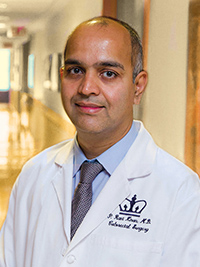Pouch disorders – both idiopathic and secondary – encompass a wide spectrum of diseases and conditions and, likewise, entail a range of medical, interventional, and surgical treatments. With efforts directed by NewYork-Presbyterian/
In 2021, Bo Shen, MD, Director of the Inflammatory Bowel Disease Center at NewYork-Presbyterian/
In 2022, Dr. Shen headed a follow-up consensus effort of the International Ileal Pouch Consortium with a focus on the treatment of inflammatory disorders of the pouch. Subsequently, P. Ravi Kiran, MD, Chief and Program Director of the Division of Colorectal Surgery at NewYork-Presbyterian/

Dr. Bo Shen

Dr. Ravi Kiran
The development process and resulting consensus guidelines for diagnosis and classification, treatment, and neoplasia were published in The Lancet: Gastroenterology & Hepatology, October 2021, January 2022, and September 2022 issues, respectively. Following are synopses of the comprehensive assignments undertaken by the International Ileal Pouch Consortium.
Consensus Guidelines on Diagnosis and Classification
While the basic science and clinical understanding of ulcerative colitis, familial adenomatous polyposis (FAP), and ileal pouch disorders have improved over the years, they remain a complicated set of conditions to diagnose and classify. One reason is inherent in the reconstructive procedures needed to improve quality of life for patients with medically refractory disease or neoplasia. However, the surgery carries the risk of structural, inflammatory, and functional complications, as well as the possibility of developing neoplasia and extraintestinal, systemic inflammatory conditions.
To facilitate clinician assessments, the International Ileal Pouch Consortium, led by Dr. Shen and Dr. Kiran at NewYork-Presbyterian/
The consensus statements, which required 80 percent agreement by the expert participants, were organized into the following sections:
- Structural complications
- Inflammatory disorders of the pouch
- Functional pouch disorders
- Pouch neoplasia
- Deficiencies and metabolic and systemic abnormalities associated with pouch disorders
The evidence level, drawn from 195 published studies and expert opinions of the consensus panel, was graded from 1 to 5, with 1 signifying the strongest evidence. Recommendations were graded from A to D, with A representing the most highly recommended. For example, within structural complications anastomotic leak was the top-ranked consequence with an evidence level of 2a and a recommendation grade of B. Statements related to diagnosis of inflammatory disorders addressed pouchitis, cuffitis, Crohn’s or Crohn’s-like disease of the pouch, diversion, pouchitis, and postcolectomy pan-enteritis.
Overall, the authors recommend:
- Clinicians should familiarize themselves with healthy anatomy and landmarks of various configurations of ileal pouches.
- Close monitoring of disease course is required as the disorder and disease phenotype evolve.
- The diagnosis of many complex pouch disorders requires a combined assessment of clinical, endoscopic, histological, and imaging features.
Consensus Guidelines on Treatment
From oral antibiotics and anti-inflammatory therapies, including biologics, to endoscopy and surgical intervention, treatment for common inflammatory disorders of the ileal pouch require careful selection based on disease activity, severity of symptoms, acuity status, and impact on quality of life. A paucity of large randomized controlled trials and case-control studies related to outcomes prompted the International Ileal Pouch Consortium to develop detailed guidelines on current therapeutic options.
Applying a similar process to the development of the diagnosis and classification guidelines, the consensus group for treatment guidelines led by Dr. Shen derived its recommendations based on an extensive literature review resulting in 188 applicable published studies and the highly specialized expertise of group members. The guidelines include both recommended treatments and those that are not recommended due to lack of evidence and where the benefits are unclear. The agreed upon statements were organized by disease – beginning with the most common disease entity as follows:
- Pouchitis
- Crohn’s disease of the pouch
- Cuffitis
- Inflammatory polyps
- Small bowel bacterial overload
- Extraintestinal manifestations
Following are just a few of the consensus statements included in the guidelines:
- Primary prophylaxis for the initial episodes of pouchitis with certain probiotics might be beneficial in patients at risk. Routine use of probiotics for the treatment of pouchitis is not recommended due to the lack of evidence.
- Anti-integrin agent, vedolizumab, is the preferred biological agent for chronic pouchitis.
- Anti-TNF agents are recommended for both induction and maintenance in inflammatory Crohn’s disease of the pouch.
- Topical mesalazine is recommended as a first-line therapy for classic cuffitis and can be used for induction therapy or maintenance therapy (for mesalazine-dependent cuffitis).
- Endoscopic polypectomy is recommended for large, symptomatic inflammatory polyps and polyps in the cuff.
- Treatment of structural or functional obstruction can help improve symptoms associated with small bowel bacterial overload.
- The prolonged use of non-steroidal anti-inflammatory drugs should be avoided in patients with ileal pouches if possible.
Consensus Guidelines on Management of Pouch Neoplasia
Patients with ulcerative colitis or FAP who undergo restorative proctocolectomy with ileal pouch-anal anastomosis (IPAA) could be at risk of developing neoplasia, albeit uncommon. However, it is recommended that these patients have a surveillance pouchoscopy at intervals depending on the their level of risk. If neoplasia does occur, a number of treatment modalities are available, including those that can be performed with endoscopy – polypectomy, ablation, mucosal resection, and submucosal dissection – and surgical options for local excision, circumferential resection and re-anastomosis, and pouch excision. The approach is determined by the grade, location, size, and features of neoplastic lesions, along with patients’ risk of neoplasia and comorbidities.
Under the leadership of Dr. Kiran at NewYork-Presbyterian/
The authors note “restorative proctocolectomy with IPAA for ulcerative colitis or FAP does not completely eradicate the risk for the development of future neoplasia.” Highlights of the consensus statements include:
- Endoscopic therapy with polypectomy, mucosal resection, or submucosal dissection is mainly indicated for low-grade dysplasia in the pouch body with polypoid or raised lesions with a clear border.
- Low-grade dysplasia in the rectal cuff can be managed endoscopically or surgically without pouch excision.
- High-grade dysplasia in general or persistent low-grade dysplasia in the rectal cuff or anal transition zone usually require local surgical resection or even pouch excision in patients with ulcerative colitis.
- Patients with adenocarcinoma or squamous cell cancer in the pouch body or parapouch areas require pouch excision in most cases.
- Although adenocarcinoma of the pouch in FAP that requires pouch excision is rare, adenomatous lesions in the pouch or parapouch area can be removed with endoscopic or surgical excisional procedures.
The authors caution that many of the recommendations could not be tied to hard evidence and that studies are needed in order to provide more definitive guidelines for the management of pouch neoplasia. Therefore, they advise that it is important that the multidisciplinary team and the patient share in decision making about treatment.





